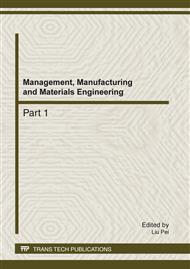p.1059
p.1064
p.1069
p.1074
p.1079
p.1084
p.1089
p.1094
p.1099
Game Analysis of People-Post Matching among the Middle Managers in Enterprises
Abstract:
The middle managers shoulder the important responsibility in the enterprise. The middle managers stress executive capability. But the executive result affects business performance directly. In order to realize strategic objectives, the enterprises must strengthen management and development of the middle managers on the base of people-post matching.The paper analyses the game between the enterprise and the middle managers on the base of the meaning and status of people-post matching. The paper builds the game matrix and portfolio strategy game. The game analysis provides decision basis for the people-post matching and development of the middle managers.
Info:
Periodical:
Pages:
1079-1083
Citation:
Online since:
January 2012
Authors:
Keywords:
Price:
Сopyright:
© 2012 Trans Tech Publications Ltd. All Rights Reserved
Share:
Citation:


